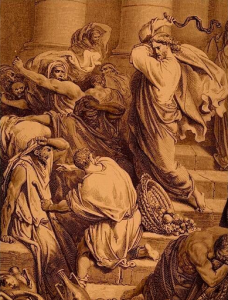by Fr. Patrick Henry Reardon
 At the beginning of Holy Week, just after the celebration of Palm Sunday, the Church turns her attention to Jesus’ act of purging of the Temple. As our guiding text here we may take Zechariah 14:20-21, the closing verses of that book:
At the beginning of Holy Week, just after the celebration of Palm Sunday, the Church turns her attention to Jesus’ act of purging of the Temple. As our guiding text here we may take Zechariah 14:20-21, the closing verses of that book:
“The vessels in the Lord’s house shall be like the bowls before the altar. Indeed, every vessel in Jerusalem and Judah shall be holiness to the Lord of hosts. Everyone who sacrifices shall come and take them and cook in them. In that day there shall no longer be a tradesman in the house of the Lord of hosts.”
In fulfillment of this prophecy, Mark records that Jesus, when he cleansed the Temple,
“would not allow anyone to carry a vessel through the temple.”
This prohibition was part of Jesus’ action in driving the tradesmen out of the Temple.
It is not easy to imagine, at this great distance in time, the drama, solemnity, and historical significance of that event. As the Gospels record it, Jesus cleansed the Temple in the context of the Passover, when its precincts were crowded with Jewish pilgrims (and, as we shall see, Gentiles) from all around the Mediterranean Basin and across the wise expanse of the Fertile Crescent. In short, the witnesses to this incident came from worldwide Judaism, that immense international family the prophets called kol Israel, “all Israel.”
Moreover, in the decades preceding this event extensive restoration and embellishment, begun under Herod the Great, had further enhanced the Temple’s attraction, greatly swelling the crowds who milled around the four markets on the Mount of Olives, where birds and other animals were sold as victims to be sacrificed during the feast.
In addition to that traditional arrangement, the Temple’s Court of the Gentiles had very recently—perhaps as recently as A. D. 30—also been made available for such commerce; it appears that Caiaphas, the current High Priest, was responsible for this development.
That is to say, the energetic deed of Jesus was a reaction, not to an ancient custom, but to an innovation introduced by the leader of those who opposed him. Purging the Temple of these mercantile provisions, Jesus was overtly challenging the authority of the High Priest; he was accusing Caiaphas, the chief custodian of the Temple, of defiling the Temple. It is no wonder that
“the scribes and chief priests heard it and devised how they might destroy him” (Mark 11:18).
It is most significant that the part of the Temple cleansed by Jesus was the Court of the Gentiles, that place set apart for those many non-Jews who had—not becoming Jews—had adopted Israel’s God as their own.
Such a group would never have existed without the Diaspora, the wide diffusion of Jewish congregations throughout the known world. In ever greater numbers, these people, called “fearers of God” (phoboumenoi ton Theon) attached themselves to local synagogues and observed as much of the Jewish piety as they were able. We know of one such man at Caesarea, named Cornelius, who kept the regular fasting days and hours of prayer.
It is hardly surprising that some of the “God-fearers” should also want to make pilgrimages to Jerusalem in order to celebrate the major feast days in the Temple. So, to accommodate them, Herod the Great had constructed a large courtyard around the Second Temple, where they could gather and worship: The Court of the Gentiles.
Caiaphas, therefore, by permitting this precinct to become a marketplace, created a scandal—a stumbling block—for these fearers of God; a house of prayer, specifically designed for them to worship Israel’s God, was thus defiled, and the devotion of faithful people was inhibited.
This, then, was the significance of Jesus’ purging of the Temple: When Jesus came there that day, he beheld the Gentiles gathered in preparation for the Passover on the coming weekend, and his indignation was aroused at beholding this affront to their piety. Today, he resolved, this must stop; this was the day prophesied by Zechariah, when
“everyone who is left of all the nations which came against Jerusalem shall go up from year to year to worship the King, the Lord of hosts” (Zechariah 14:16).
The Lord expressed his indignation that day by quoting the prophecy of Isaiah:
“My house shall be a house of prayer for all the nations.”
